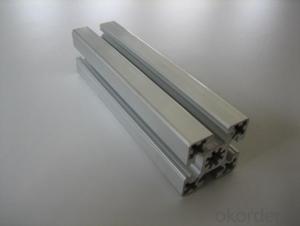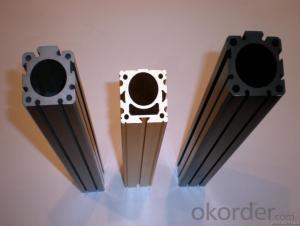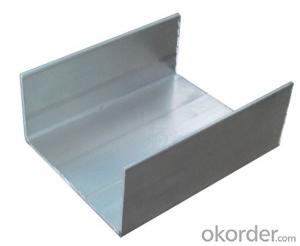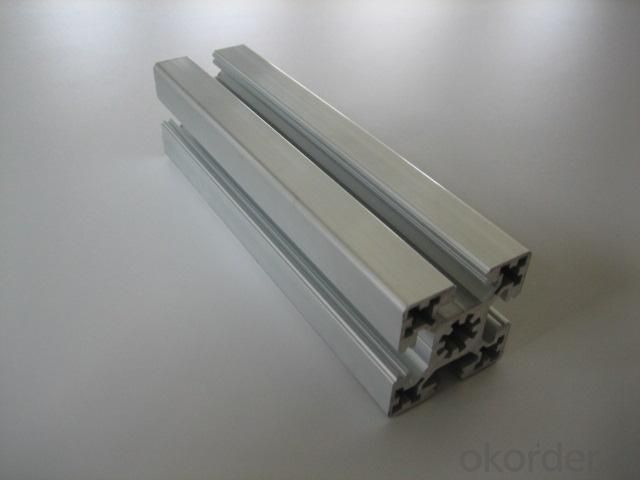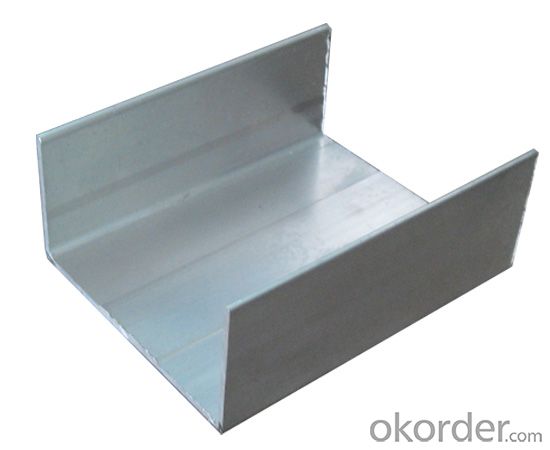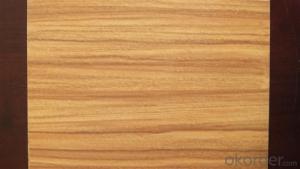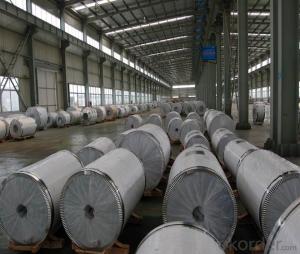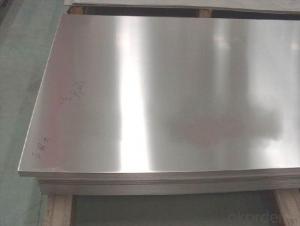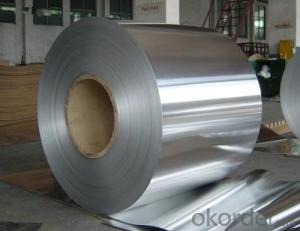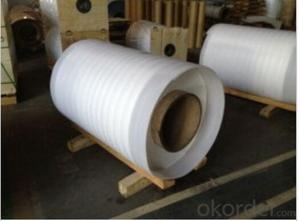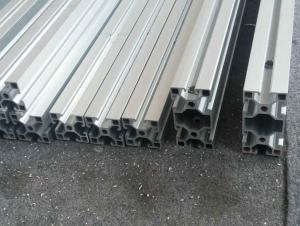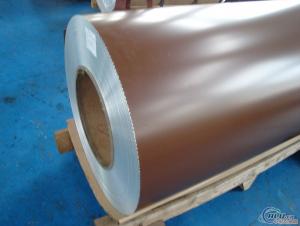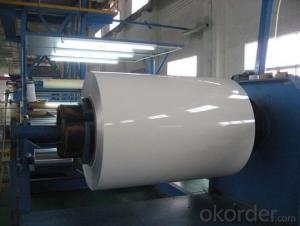Coiled Aluminum Sheet for Customized Closet Door Profiles
- Loading Port:
- Shanghai
- Payment Terms:
- TT OR LC
- Min Order Qty:
- 20 m.t.
- Supply Capability:
- 2000 m.t./month
OKorder Service Pledge
OKorder Financial Service
You Might Also Like
1.Structure of Customized Aluminum Profile for Closet Door Description:
Customized Aluminum Profile for Closet Door (also spelled anodising, particularly in the UK and Australia) is an electrolytic passivation process used to increase the thickness of the natural oxide layer on the surface of metal parts. Anodized aluminium surfaces, for example, are harder than aluminium but have low to moderate wear resistance that can be improved with increasing thickness or by applying suitable sealing substances.
2.Main Features of the Customized Aluminum Profile for Closet Door:
High corrosion-resistance;
weather-resistance;
heat-resistance;
alkali-resistance and impact-resistance properties.
3.Customized Aluminum Profile for Closet Door Images:
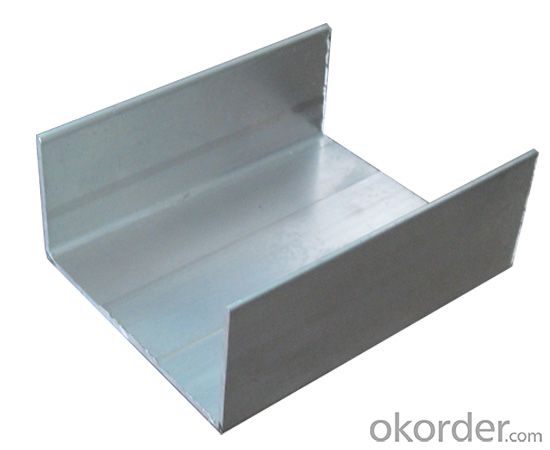
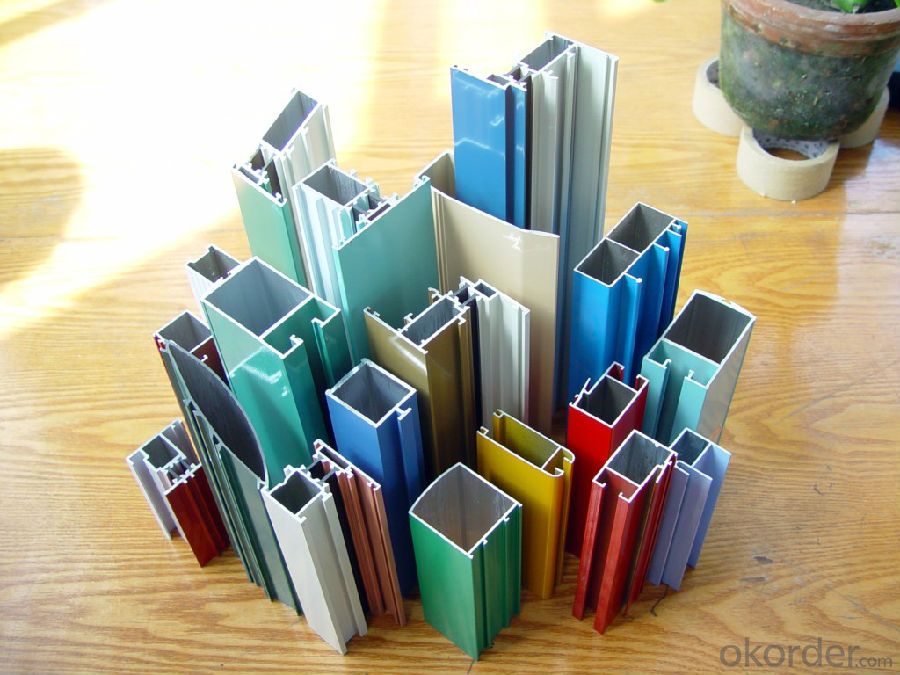
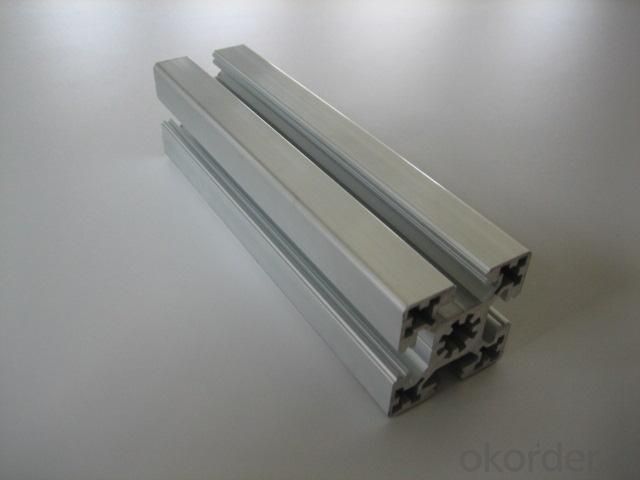
4.Customized Aluminum Profile for Closet Door Specification:
1. Material: 6063,6061,6060,6005,6005A,etc.
2. Temper: T5 or T6
3. Finish: Mill finish, anodizing, powder coating, electrophoresis, wooden transfer or pvdf/carbon-flouride coated, polishing, brushing, sand blasting
4. Various colors: Silver, bronze, black, gold, blue, grey, champagne, bright, etc.
5. Machining: Cutting, punching, drilling, tapping, milling, bending, welding, CNC etc.
5.FAQ:
①How about your company?
A world class manufacturer & supplier of castings forging in carbon steel and alloy steel,is one of the large-scale professional investment casting production bases in China, consisting of both casting foundry forging and machining factory. Annually more than 8000 tons Precision casting and forging parts are exported to markets in Europe, America and Japan. OEM casting and forging service available according to customer’s requirements.
②How to guarantee the quality of the products?
We have established the international advanced quality management system,every link from raw material to final product we have strict quality test;We resolutely put an end to unqualified products flowing into the market. At the same time, we will provide necessary follow-up service assurance.
- Q: Can aluminum coils be used in food processing or packaging applications?
- Yes, aluminum coils can be used in food processing or packaging applications. Aluminum is a safe and reliable material that is widely used in the food industry due to its corrosion resistance, heat conductivity, and ability to maintain product quality. It is commonly used for making food containers, cans, foil, and other packaging materials.
- Q: How are aluminum coils used in the production of medical equipment?
- Aluminum coils are widely used in the production of medical equipment due to their unique properties and versatility. One of the primary applications of aluminum coils in the medical industry is in the manufacturing of various medical devices, such as MRI machines, X-ray machines, and ultrasound equipment. Aluminum coils are utilized in the production of medical equipment mainly because of their excellent conductivity. This property allows them to efficiently conduct and dissipate heat, which is crucial for the proper functioning of medical devices. For instance, MRI machines generate a significant amount of heat during operation, and aluminum coils help in regulating and maintaining the desired temperature to ensure optimal performance and patient safety. Moreover, aluminum coils are also highly malleable and can be easily formed into different shapes and sizes. This makes them ideal for the production of medical equipment, where intricate designs and precise specifications are often required. For example, aluminum coils are used in the construction of radiation shields, which protect medical personnel and patients from harmful radiation emitted by X-ray machines. In addition, aluminum coils are lightweight yet durable, making them an excellent choice for medical equipment that needs to be portable or easily maneuvered. This is particularly important for devices like portable ultrasound machines, where lightweight components are necessary for ease of use and transportation. Furthermore, aluminum coils have excellent corrosion resistance, which is vital in the medical field where cleanliness and hygiene are of utmost importance. The resistance to corrosion helps in preventing the buildup of bacteria, germs, and other contaminants on the surface of medical equipment, ensuring a safe and sterile environment for patients and healthcare professionals. Overall, aluminum coils play a crucial role in the production of medical equipment by providing properties such as conductivity, malleability, lightweight, durability, and corrosion resistance. These properties allow for the efficient and safe operation of medical devices, contributing to improved patient care and well-being.
- Q: I have a muffin pan made of aluminum foil and I do not know if i can put it in the oven to cook some muffins. Many sights say it will melt but they say that about putting a sheet of foil at the bottom of the oven for a long time. I just want it to be in their for half an hour to make muffins.
- Aluminum melts at 1220 degrees F (or around 660 degrees C) [from Wikipedia]. If you are cooking anything at that temperature, you are crazy and have a monster oven. So yeah, no problem with that.
- Q: How are aluminum coils protected during shipping?
- Aluminum coils are protected during shipping through various methods to ensure their safety and prevent any damage. One common method is the use of protective packaging materials such as bubble wrap, foam, or corrugated cardboard. These materials are used to wrap the coils and create a cushioning effect, absorbing any impact or vibration that may occur during transportation. In addition to protective packaging materials, aluminum coils are often placed in sturdy shipping containers or crates. These containers are designed to provide extra security and stability during transit, minimizing the risk of the coils being jostled or bumped. Moreover, in some cases, aluminum coils are secured with strapping or banding to keep them in place and prevent shifting or movement during transportation. This helps to maintain the integrity of the coils and minimize the risk of damage caused by rubbing against other objects. Furthermore, shipping companies may also use air-bag systems or dunnage bags to fill any empty spaces within the shipping container. This further reduces movement and provides an additional layer of protection for the coils. Overall, the protection of aluminum coils during shipping involves a combination of packaging materials, secure containers, and preventive measures to ensure their safe arrival at their destination.
- Q: Are aluminum coils suitable for electrical conductors?
- Yes, aluminum coils are suitable for electrical conductors. Aluminum is a good conductor of electricity, second only to copper in terms of conductivity. It is widely used in various electrical applications, including power transmission lines, wiring, and electrical coils. Aluminum coils offer excellent electrical conductivity while also being lightweight, cost-effective, and resistant to corrosion.
- Q: Can aluminum coils be used in food packaging?
- Indeed, food packaging can make use of aluminum coils. Aluminum, a secure and adaptable substance, has enjoyed extensive usage in the food packaging sector for numerous years. It provides numerous advantages, including its lightweight nature, resistance to corrosion, and exceptional thermal conductivity. These qualities render it perfect for food packaging scenarios that prioritize the maintenance of food product quality, freshness, and safety. Aluminum coils can be conveniently molded into various shapes and dimensions, permitting tailored packaging solutions. Furthermore, aluminum qualifies as a sustainable material due to its 100% recyclability, further augmenting its allure for food packaging purposes.
- Q: Are there any specific safety guidelines for installing aluminum coils?
- Yes, there are specific safety guidelines for installing aluminum coils. Here are some key points to consider: 1. Personal Protective Equipment (PPE): Always wear the appropriate PPE, including safety glasses, gloves, and a respirator if working in a confined space or handling chemicals. 2. Handling and lifting: Aluminum coils can be heavy, so it is important to use proper lifting techniques and equipment to prevent strains or injuries. Ensure that the area is clear of obstacles and that there is enough space to maneuver the coils safely. 3. Secure the area: Before starting the installation process, make sure the work area is clean and free of any hazards. Remove any debris or potential trip hazards to prevent accidents. 4. Electrical safety: If the installation involves electrical connections or wiring, it is crucial to adhere to electrical safety guidelines. This includes turning off the power supply and using appropriate tools and equipment to avoid electric shocks. 5. Proper ventilation: Aluminum coils may release fumes or gases during installation, especially when soldering or welding. Ensure that the work area is well-ventilated to prevent the accumulation of harmful gases. If necessary, use exhaust fans or ventilation systems to maintain air quality. 6. Adhering to manufacturer's instructions: Always follow the manufacturer's guidelines and recommendations for installing aluminum coils. This includes proper handling, mounting, and connecting procedures. Failure to follow these instructions may result in substandard installation or potential safety hazards. 7. Training and expertise: It is important to have the necessary knowledge and skills to install aluminum coils safely. Ensure that the installation team is properly trained and experienced in working with aluminum coils to minimize risks and ensure a successful installation. By following these safety guidelines, you can ensure a safe and efficient installation of aluminum coils while reducing the potential for accidents or injuries.
- Q: What are the different alloys used in aluminum coils?
- Aluminum coils are made using various alloys, each possessing unique properties and applications. Some commonly employed alloys include: 1. 3003: Renowned for its exceptional formability and resistance to corrosion, this alloy finds frequent use in applications requiring moderate strength, such as automotive components, storage tanks, and kitchen utensils. 2. 5052: An alloy characterized by its versatility, good corrosion resistance, high fatigue strength, and excellent weldability. It is commonly utilized in the production of aircraft fuel tanks, marine components, and architectural applications. 3. 6061: Distinguished by its high strength and excellent machinability, 6061 is often employed in structural components like frames and braces. It also offers good corrosion resistance, making it a popular choice in the aerospace and automotive industries. 4. 8011: Primarily used in the packaging industry, particularly for manufacturing aluminum foil. This alloy provides good formability, high tensile strength, and excellent resistance to moisture and chemicals. 5. 1100: A commercially pure aluminum alloy, prized for its high electrical and thermal conductivity. It is commonly utilized in electrical wiring, heat exchangers, and lighting fixtures. These examples represent only a fraction of the alloys available for aluminum coils, as there are numerous other variations tailored to specific requirements and applications. The choice of alloy depends on several factors, such as desired strength, corrosion resistance, formability, and cost considerations.
- Q: What type of equipment is used to process aluminum coils?
- The equipment used to process aluminum coils varies depending on the specific manufacturing process and requirements. However, some common types of equipment used in aluminum coil processing include: 1. Uncoilers/Decoilers: These machines are used to unwind and straighten the aluminum coils, allowing for further processing. 2. Levelers: Leveling machines are used to flatten the aluminum coil's surface, ensuring that it is flat and even before further processing. 3. Slitters: Slitting machines are utilized to cut the aluminum coil into narrower strips of desired widths. This equipment is often used in industries like automotive, construction, and packaging. 4. Shears: Shearing machines are used to cut the aluminum coil into specific lengths or shapes required for the manufacturing process. 5. Roll Forming Equipment: Roll forming machines are used to shape the aluminum coil into specific profiles or designs. This equipment is commonly used in the construction industry for manufacturing roofing panels, gutters, and siding. 6. Heat Treatment Furnaces: Heat treatment furnaces are used to subject the aluminum coil to specific temperature conditions to enhance its strength, hardness, or other desired properties. 7. Surface Treatment Equipment: Equipment such as cleaning machines, chemical baths, and coating lines are used for surface treatment processes like cleaning, anodizing, or painting the aluminum coil to improve its appearance, corrosion resistance, or other functional properties. 8. Packaging Equipment: Packaging machines are used to bundle, wrap, or pack the processed aluminum coils for storage, transportation, or further distribution. It is important to note that the specific equipment used may differ depending on the size, thickness, alloy, and intended use of the aluminum coils. Manufacturers often employ customized equipment to meet their specific requirements and ensure efficient processing.
- Q: Can aluminum coils be used in high-humidity environments?
- Yes, aluminum coils can be used in high-humidity environments. Aluminum is a corrosion-resistant metal, making it suitable for applications in areas with high humidity levels. The natural oxide layer that forms on the surface of aluminum acts as a protective barrier against moisture and prevents the metal from rusting or corroding. This makes aluminum coils a popular choice for HVAC systems, where they are exposed to moisture and humidity on a regular basis. Additionally, aluminum coils are lightweight, durable, and have excellent heat transfer properties, making them an ideal choice for various industrial and commercial applications in high-humidity environments.
Send your message to us
Coiled Aluminum Sheet for Customized Closet Door Profiles
- Loading Port:
- Shanghai
- Payment Terms:
- TT OR LC
- Min Order Qty:
- 20 m.t.
- Supply Capability:
- 2000 m.t./month
OKorder Service Pledge
OKorder Financial Service
Similar products
Hot products
Hot Searches
Related keywords
